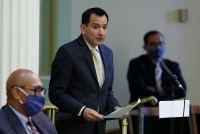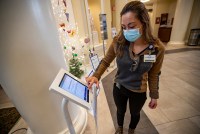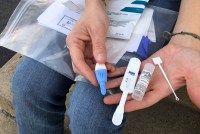Latest KFF Health News Stories
Violent Colorado Arrest Puts Spotlight on How Police Treat Disabled People
Criminal charges filed against two officers who injured a Colorado woman with dementia don’t address the fact that police often lack the skills to effectively deal with suspects with mental disabilities.
En crisis de salud mental, el 911 ahora no siempre responde con policías
Cada vez más terapeutas forman parte de los equipos de emergencia. Y en 2022 habrá una una nueva línea específica para crisis de salud mental: el 988.
In Mental Health Crises, a 911 Call Now Brings a Mixed Team of Helpers — And Maybe No Cops
More communities are creating teams of health care providers to respond to mental health crises instead of cops, a shift propelled by nationwide demonstrations against police brutality. But the shapes of those mobile crisis response teams vary because the movement is still in an experimental stage.
Colorado está a punto de aprobar una ley para que los trabajadores del campo puedan acceder a atención médica, algo que muchos empleadores al parecer no permiten.
Farmworkers Recall Mistreatment as Colorado Aims to Guarantee Medical Access
Agricultural workers living in employer-owned housing can have trouble getting health care. It’s symptomatic of bigger gaps in worker protections that the pandemic spotlighted, say proponents of a newly passed Colorado bill for farmworker rights.
Kidney Experts Say It’s Time to Remove Race From Medical Algorithms. Doing So Is Complicated.
When estimating how well a patient’s kidneys are working, doctors frequently turn to an equation that depends on a question: Is the patient Black? Kidney experts are now debating how to remove the race adjustment and whether the question is a function of sound science. It’s considered just the first step in dismantling institutional racism in kidney care.
With Restrictions Tightening Elsewhere, California Moves to Make Abortion Cheaper
California lawmakers are debating a bill that would eliminate out-of-pocket costs that often prevent people from obtaining abortions, proponents say.
Many New Moms Get Kicked Off Medicaid 2 Months After Giving Birth. Illinois Will Change That.
Each year, hundreds of thousands of new mothers lose Medicaid coverage after 60 days when their income exceeds limits. But deadly childbirth complications persist months longer.
Newsom Wants to Spend Millions on the Health of Low-Income Mothers and Their Babies
Democratic legislators back measures that would end the “pink tax” on diapers and menstrual products, provide mental health support, and pilot a guaranteed-income program.
From Racial Justice to Dirty Air, California’s New AG Plots a Progressive Health Care Agenda
In a candid interview, California’s newly appointed attorney general, Rob Bonta, reflects on his progressive roots and says he will pursue a health care agenda centered on the principle that quality medical care is a right, not a privilege.
Confronting Our ‘Frailties’: California’s Assembly Leader Reflects on a Year of Covid
California Assembly Speaker Anthony Rendon says covid exposed long-standing health care inequities that must be addressed. He told KHN he wants to get more people insured, boost broadband access so more patients can use telehealth and increase funding to local health departments.
Racism Derails Black Men’s Health, Even as Education Levels Rise
Researchers who study health among various racial and ethnic groups, as well as the social factors that influence health outcomes, say the findings suggest that the power of discrimination to harm Black men’s health may be more resistant than previously understood.
Telemedicine Is a Tool — Not a Replacement for Your Doctor’s Touch
The pandemic has demonstrated that virtual medicine is great for simple visits. But many new types of telemedicine promoted by start-ups more clearly benefit providers’ and investors’ pockets, rather than yielding more convenient, high-quality and cost-effective medicine for patients.
In Appalachia and the Mississippi Delta, Millions Face Long Drives to Stroke Care
Across Appalachia and the Mississippi Delta, where death rates from stroke are above the national average, routing patients from rural areas to the right level of care can be an intricate jigsaw puzzle. The closest hospital might not offer the full scope of stroke treatments, but hospitals with more advanced care could be hours away.
A lo largo de los Apalaches y del delta del Mississippi, donde las tasas de muertes por ataques cerebrales está por encima del promedio nacional, dirigir a los pacientes de áreas rurales al nivel adecuado de atención puede ser un rompecabezas intrincado. El hospital más cercano puede no ofrecer un espectro completo de tratamientos, y los centros de atención de avanzada pueden estar a horas de distancia.
La pandemia ha puesto más en peligro a los que no hablan inglés
Al comienzo de la pandemia, médicos del Brigham and Women Hospital observaron lo que se sería una siniestra estadística: los pacientes que sabían poco o nada de inglés tenían un 35% más de posibilidades de morir.
Pandemic Imperiled Non-English Speakers More Than Others
Covid patients who did not speak English well were 35% more likely to die, data from one Boston hospital shows.
From Hospital Profits to Gender Gaps, Journalists Are on the Case
KHN and California Healthline staff made the rounds on national and local media this week to discuss their stories. Here’s a collection of their appearances.
Peligran avances contra el VIH por la lucha contra covid, en especial en el sur del país
El impacto exacto de una pandemia sobre la otra todavía está por evaluarse, pero los datos preliminares inquietan a expertos que hasta hace poco celebraban los enormes avances en el tratamiento del VIH.
Strides Against HIV/AIDS Falter, Especially in the South, as Nation Battles Covid
Public health resources have shifted from one pandemic to the other, and experts fear steep declines in testing and diagnoses mean more people will contract HIV and die of AIDS.






















